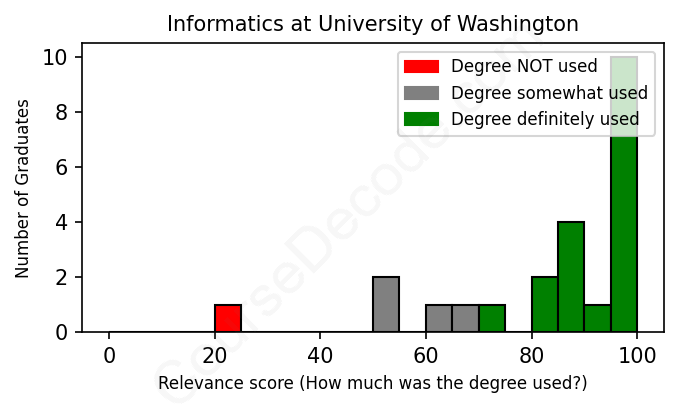
First, some facts. Of the Informatics graduates from University of Washington we've analyzed , here's how many have used (or NOT used) their degree in their career:

These are estimates based on AI analysis of 23 LinkedIn profiles (see below).
The verdict? Significantly above average. Overall, with an average relevance score of 83%, Informatics graduates from University of Washington have a much higher likelihood (+16%) of finding work in this field compared to the average graduate across all fields:
And for comparison, here's the chart for all profiles we've looked at across all degrees.
Also, after graduating, only 8% of these graduates have pursued further education other than another Bachelor's degree (such as a Masters degree or other), compared to the average across all profiles of 35%. This suggests a Bachelors degree is enough for most Informatics graduates, and it's normal to look for work straight after graduation.
See the details:
|
Relevance score: 100% We think this person has gone into a career highly relevant to their degree. We think this person has gone into a career highly relevant to their degree.
DEGREE INFOGraduated in 2017 from University of Washington with a Bachelor of Science (B.S.) in Informatics. No other secondary education since. JOB HISTORY SINCE GRADUATIONSenior Data Engineer Liberty Mutual Insurance Oct 2022 - Present ABOUTAt Liberty Mutual, I enable business teams to manage and analyze data by supporting the development operations of Business Intelligence and Data Virtualization platforms using AWS cloud services |
The top 10 most common jobs done by the graduates we've analyzed (ranked most common to least) are:
After analyzing various LinkedIn profiles of University of Washington graduates who studied Informatics, it seems like a bunch of them landed roles that are closely tied to their degree. The most common jobs include positions like Software Engineer, Data Engineer, and Software Developer, all of which leverage the coding, data management, and systems design skills that students gain during their studies. Roles in software engineering at major companies like Microsoft, Amazon, and Liberty Mutual really showcase how graduates are utilizing their informatics knowledge in the tech industry. Even positions like Principal Software Engineer and Senior Software Architect illustrate a clear connection to the principles covered in their informatics coursework.
However, not every job listed is directly relevant to Informatics. Some graduates have ventured into roles that seem more about sales, marketing, or project management, which don’t necessarily utilize specific skills from the Informatics curriculum. For instance, jobs like Community Manager or Marketing Manager may touch on some tech-related skills but largely focus on areas outside of core informatics. Overall, while many graduates are undoubtedly applying their knowledge in relevant fields, it's clear that there are opportunities out there that aren't as closely linked to the informatics skills they developed during their academic journey. So, it’s a bit mixed, but plenty of folks are definitely putting that Informatics degree to good use!
Here is a visual representation of the most common words in job titles for Informatics graduates (this is across all Informatics graduates we've analyzed, not just those who went to University of Washington):

Graduates from the Informatics program at the University of Washington generally embark on promising career paths, particularly within technology and related fields. For many of these graduates, their first job after graduation tends to be in software development or engineering roles. For instance, a common start includes positions like Software Engineer, Data Engineer, or various technical roles at major companies like Amazon, Microsoft, and Liberty Mutual. This trend suggests that graduates are often stepping directly into roles that utilize their technical skills, making it clear that the degree prepares them well for the workforce.
Looking five to ten years down the line, it’s evident that many graduates are advancing their careers significantly. Several have transitioned from junior positions to senior titles, such as Senior Software Engineer or Principal Software Engineer, often remaining within reputable companies and taking on more complex challenges. Some alumni become specialized in areas like data engineering or solutions architecture, indicating a progressive increase in their technical and managerial responsibilities. It's also notable that some graduates have even branched out into related fields, such as product design or project management, reflecting the versatility of the Informatics degree. Overall, it seems like most graduates are doing quite well and thriving in relevant and rewarding careers.
Honestly, a Bachelor’s degree in Informatics at the University of Washington is pretty challenging, but it can also be super rewarding. The program dives into a mix of tech, design, and social sciences, which means you'll be dealing with everything from coding to understanding user behavior. There's a good amount of group projects, hands-on work, and, yeah, lots of assignments that require both creativity and analytical thinking. If you’re someone who enjoys problem-solving and can keep up with the workload, you’ll probably thrive; but if you're not keen on rigorous study or you find math and tech tough, it might feel overwhelming at times. Overall, it's about average in terms of difficulty, but it definitely pushes you to think critically and work collaboratively.
Most commonly, in the LinkedIn profiles we've looked at, it takes people 4 years to finish a Bachelor degree in Informatics.
Looking at these Informatics graduates from the University of Washington, it definitely seems like they’re in pretty decent shape when it comes to earning potential. Many of them have landed solid roles at well-known companies like Amazon, Microsoft, and Liberty Mutual, often moving up to senior positions within just a few years. The ones in software engineering and data roles are particularly in a good spot, as those careers typically pay really well, especially as they gain experience. Even the graduates in other fields like product engineering and digital assurance are making their mark in reputable firms. So yeah, if you’re thinking about a career in informatics, it looks like it can lead to some good money down the line!
Here is a visual representation of the most common words seen in the "about" section of LinkedIn profiles who have a Bachelor degree in Informatics (this is across all Informatics graduates we've analyzed, not just those who went to University of Washington). This may or may not be useful:

Here are all colleges offering a Bachelor degree in Informatics (ordered by the average relevance score of their Informatics graduates, best to worst) where we have analyzed at least 10 of their graduates:
| College | Score | Count |
|---|---|---|
 University of Washington University of Washington
|
83 | 23 |
 Indiana University Bloomington Indiana University Bloomington
|
71 | 47 |